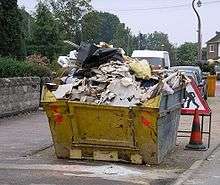Skip (container)

A skip (UK English) or dumpster[1][2] (US and Canadian English)[notes 1] is a large open-topped waste container designed for loading onto a special type of lorry. Instead of being emptied into a garbage truck on site, as a wheelie bin is, a skip is removed, or replaced by an empty skip, and then tipped at a landfill site or transfer station.
Typically skip bins have a distinctive shape: the longitudinal cross-section of the skip bin is either a trapezoid or two stacked trapezoids. The lower trapezoid has the smaller edge at the bottom of the skip bin, and a longer edge at the top. Where there is an upper trapezoid, it has the smaller edge at the top. At either end of the skip bin there is a sloping floor or wall. There are usually two lugs at the ends of the bin onto which chains can be attached, permitting the heavy skip bin to be lifted onto and off a lorry.[3] A special skip-carrying lorry or crane is used.
One end of the skip sometimes has a large door that hinges down to allow manual loading and unloading. Skips are usually durable and tough, made to withstand rough use by tradesmen and labourers. The size of skip bins can vary greatly depending on their use, with sizes ranging from small 2 yard mini skips to the very large 40 yard roll-on roll-off skips.[4] Even though these large bins can store many tonnes of waste, most lorries are limited to carrying around 8 tonnes (8,000 kg) of material in the container.
A typical small skip, when empty, weighs about 250 kilograms (550 lb).
Uses
Skips are commonly used to hold open-topped loads of construction and demolition waste or other waste and litter types. The construction debris may originate from a building, renovation, or demolition site; building supplies can be delivered to a site in a skip that is later used to remove waste. Skips are also used for various cleaning-out jobs that need much material to be taken away, and at factories producing large quantities of scrap metal. The material in the skip may be taken to a landfill, recycled or recovered/disposed of in some other way.
Etymology
The origins of calling a rubbish cart a skip (most often found in Australia and the UK) come from the word 'skep', used to refer to a basket. 'Skep' itself comes from the Late Old English sceppe, from Old Norse skeppa 'basket'.
See also
Notes
- ↑ The term "skip" is unknown and incomprehensible in North America (outside of the mining industry) and is not even listed in this sense in Merriam-Webster's Dictionary.
References
- ↑ http://www.oxforddictionaries.com/us/definition/american_english/skip#skip-2
- ↑ http://www.dictionary.cambridge.org/dictionary/british/skip_5
- ↑ Shergold, Steve. "Skip Bin Overview". Bins Skips Waste and Recycling. Retrieved 7 March 2013.
- ↑ "Skip Sizes". Skip Hire Services. Retrieved 10 February 2016.